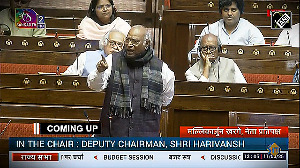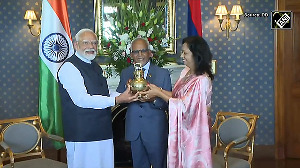The Madras high court on Tuesday held that the devotees of Thenkalai sect must be given the first two or three rows inside the Varadaraja Perumal temple in Kanchipuram and behind them the Vadakalai sect, and ordinary devotees shall be permitted to sit in the remaining available space.

Justice S M Subramaniam gave a direction to this effect while passing orders on a writ petition from one S Narayanan challenging a notice issued by the temple assistant commissioner/executive trustee in the midnight of May 14, which permitted the persons belonging to Thenkalai alone to recite their Prabandhams and take part in the rituals/ceremonies of the ongoing temple Brahmotsavam festival. Thenkalai and Vadakalai are Vaishnavite sects.
"Considering the facts and circumstances, this court is of the opinion that religious rights of devotees, worshippers are to be protected. The guarantee under Articles 25 and 26 of the Constitution for the rituals and observance, ceremonies and modes of worship, which all are integral part of religious practices, are also to be taken into consideration by the courts," the judge said.
In the present case, the right of primacy to chant the initial recital and Prabandham by the Thenkalai sect is not disputed by the Vadakalai sect. Their request is that they may also be permitted to chant the initial ritual, namely, Sri Ramanuja Dayapathram and thereafter, chant Prabandham along with the Thenkalai sect, which would be more effective for completion of the rituals in the temple. The Vadakalai sect are ready and willing to co-operate for the peaceful observance of rituals without affecting the rights of Thenkalai sect.
"Under these circumstances, this court is of the considered opinion that both the sects are expected to respect each other's religious rites and sentiments and right to worship and the guarantee conferred under Articles 25 and 26 of the Constitution of India," the judge said.
The seating arrangements shall be regulated by the assistant commissioner/executive trustee of the temple in such a manner without affecting the discipline and decorum of the rituals and puja activities, the judge said.
The judge said that the initial recital, namely, Sri Ramanuja Dayapathram within 10 to 12 seconds each and thereafter, both the Thenkalai and Vadakalai sects and ordinary devotees shall be permitted to jointly chant Naalayira Divya Prabandham in an uniform manner without disrupting the rituals and pujas and without causing any inconvenience or nuisance to the other devotees and worshippers who are present in the temple.
On completion of the chanting of Naalayira Divya Prabandham by the Vadakalai sect, Thenkalai sect and ordinary devotees jointly, the final ritual, namely, Vazhithirunamam may be first chanted by the Thenkalai.
Thereafter, the Vadakalai sect shall be allowed to recite their concluding mantra, ie, Desikan Vazhi Thirunamam, and accordingly, the entire process of rituals shall be concluded.
The AC/ET shall monitor the observance of the rituals both by the Thenkalai and Vadakalai sects and in the event of any violations of discipline and decorum, initiate appropriate action in the manner known to law including penal actions.
The AC/ET shall make the above arrangements with immediate effect and videograph the events and produce the same before the court during the next hearing on May 25, the judge added.










 © 2025
© 2025